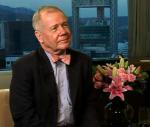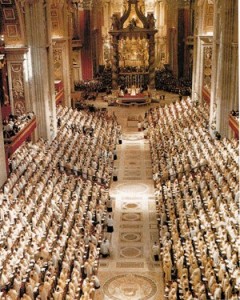VATICAN CITY, Oct 24 (Reuters) – – The Vatican called on Monday for the establishment of a “global public authority” and a “central world bank” to rule over financial institutions that have become outdated and often ineffective in dealing fairly with crises.
The document from the Vatican’s Justice and Peace department should please the “Occupy Wall Street” demonstrators and similar movements around the world who have protested against the economic downturn.
“Towards Reforming the International Financial and Monetary Systems in the Context of a Global Public Authority,” was at times very specific, calling, for example, for taxation measures on financial transactions.
“The economic and financial crisis which the world is going through calls everyone, individuals and peoples, to examine in depth the principles and the cultural and moral values at the basis of social coexistence,” it said.
It condemned what it called “the idolatry of the market” as well as a “neo-liberal thinking” that it said looked exclusively at technical solutions to economic problems.
“In fact, the crisis has revealed behaviours like selfishness, collective greed and hoarding of goods on a great scale,” it said, adding that world economics needed an “ethic of solidarity” among rich and poor nations.
“If no solutions are found to the various forms of injustice, the negative effects that will follow on the social, political and economic level will be destined to create a climate of growing hostility and even violence, and ultimately undermine the very foundations of democratic institutions, even the ones considered most solid,” it said.
It called for the establishment of “a supranational authority” with worldwide scope and “universal jurisdiction” to guide economic policies and decisions.
Such an authority should start with the United Nations as its reference point but later become independent and be endowed with the power to see to it that developed countries were not allowed to wield “excessive power over the weaker countries”.
Asked at a news conference if the document could become a manifesto for the movement of the “indignant ones”, who have criticised global economic policies, Cardinal Peter Turkson, head of the Vatican’s Justice and Peace department, said:
“The people on Wall Street need to sit down and go through a process of discernment and see whether their role managing the finances of the world is actually serving the interests of humanity and the common good.
“We are calling for all these bodies and organisations to sit down and do a little bit of re-thinking.”
EFFECTIVE STRUCTURES
In a section explaining why the Vatican felt the reform of the global economy was necessary, the document said:
“In economic and financial matters, the most significant difficulties come from the lack of an effective set of structures that can guarantee, in addition to a system of governance, a system of government for the economy and international finance.”
It said the International Monetary Fund (IMF) no longer had the power or ability to stabilise world finance by regulating overall money supply and it was no longer able to watch “over the amount of credit risk taken on by the system”.
The world needed a “minimum shared body of rules to manage the global financial market” and “some form of global monetary management”.
“In fact, one can see an emerging requirement for a body that will carry out the functions of a kind of ‘central world bank’ that regulates the flow and system of monetary exchanges similar to the national central banks,” it said.
The document acknowledged that such change would take years to put into place and was bound to encounter resistance.
“Of course, this transformation will be made at the cost of a gradual, balanced transfer of a part of each nation’s powers to a world authority and to regional authorities, but this is necessary at a time when the dynamism of human society and the economy and the progress of technology are transcending borders, which are in fact already very eroded in a globalised world.” (Reporting By Philip Pullella; editing by Elizabeth Piper)
 ADDING UP THE FACTS FULLY ENDORSES RON PAUL 2012- Ron Paul Voting Record-
ADDING UP THE FACTS FULLY ENDORSES RON PAUL 2012- Ron Paul Voting Record- BALLENGER ASSET MANAGEMENT & RESEARCH- MARK BALLENGER-
BALLENGER ASSET MANAGEMENT & RESEARCH- MARK BALLENGER- JIM ROGERS BLOG-
JIM ROGERS BLOG- MARC FABER BLOG-
MARC FABER BLOG- PETER SCHIFF & SCHIFF RADIO-
PETER SCHIFF & SCHIFF RADIO-



 RON PAUL ACCESSORIES-
RON PAUL ACCESSORIES- RON PAUL 2012 OFFICIAL WEBSITE
RON PAUL 2012 OFFICIAL WEBSITE